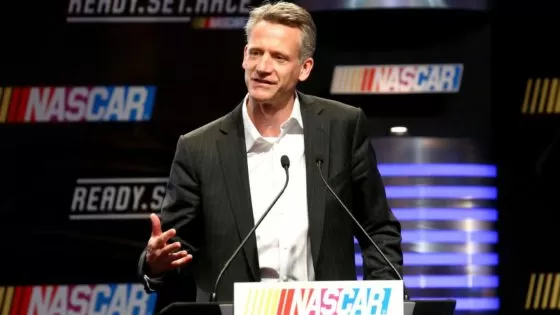In 2016, BJ McLeod made a seemingly small investment that would eventually lead to a huge payoff. The NASCAR driver purchased a charter for just $1 million, a move that went relatively unnoticed in the racing world. Little did anyone know, this purchase would eventually set off a domino effect that would change the landscape of NASCAR forever.
Fast forward to 2023, and that same charter, which was now in the hands of Spire Motorsports, was sold for a whopping $40 million. This transaction may not have made headlines like a championship win or a fiery crash at Daytona, but it was a clear indication of the changing dynamics within the sport.
NASCAR has long been known as a sport for the working class, with humble beginnings rooted in moonshine running. But as the sport grew in popularity and revenue, it also attracted the attention of wealthy individuals looking to make a name for themselves in the racing world. And with the introduction of charters in 2016, this interest only intensified.
For those who may not be familiar with the term, a charter is essentially a guaranteed spot in the starting lineup for every race, along with a larger share of the prize money and other benefits. Before 2016, teams had to qualify for each race, and lower budget teams often struggled to secure a spot. The introduction of charters meant that teams could now secure their place in every race, providing a sense of stability and financial security.
However, with only 36 charters available, the demand for them quickly surpassed the supply. This created a “gold rush” era, where billionaires and corporate entities vied for ownership of these coveted charters. The $40 million sale of Spire Motorsports’ charter was just one example of the astronomical amounts being paid for these valuable assets.
This sudden influx of wealth in NASCAR has raised some concerns among fans and industry insiders. Many worry that the sport may lose its roots and become a playground for the wealthy, rather than a representation of hard work and determination. NASCAR CEO Steve Phelps recently addressed these concerns, assuring fans that the influx of money and interest in the sport is a positive thing.
According to Phelps, the increase in value of NASCAR charters is a sign of growth and stability within the industry. The influx of wealthy individuals and corporations is bringing new resources and opportunities to the sport, allowing for continued growth and innovation. He also emphasized that this does not mean that the sport is becoming less accessible to the average person. In fact, he stated that many of these new investors have a deep love for the sport and are committed to preserving its core values.
It’s also worth noting that this “money talks” mentality is not unique to NASCAR. In fact, it’s a common trend in most competitive industries. As the sport continues to grow and attract a wider audience, it’s only natural that it will also draw the attention of those who can afford to invest.
At the end of the day, it’s important to remember that NASCAR is still a sport fueled by passion and ambition. The drivers, teams, and sponsors are all driven by the same desire to win that has been a part of NASCAR since its inception. And while the influx of wealth may bring about some changes, it’s clear that the heart and soul of the sport will remain intact.
As the saying goes, “with great risk comes great reward.” The “gold rush” era may have caused some unease among fans, but it’s also a sign of progress and prosperity for NASCAR. As long as the sport continues to evolve and grow, it will remain a beloved American pastime that inspires and captivates audiences around the world.
In the end, BJ McLeod’s $1 million investment in 2016 may have seemed modest at the time, but it ultimately sparked a chain of events that transformed the sport into a billion-dollar industry. And with the guidance of leaders like Steve Phelps, NASCAR will continue to thrive and remain a symbol of hard work, determination, and the pursuit of the American dream.

